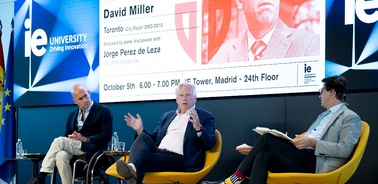David Miller, former Mayor of Toronto: "A climate plan is a powerful engine for urban economic development"

Madrid, October 5, 2023. David Miller, Managing Director of C40 Cities Center for City Climate Policy and Economy and former Mayor of Toronto shared his views at the opening of the 7th edition of IE School of Architecture and Design’s Master in Real Estate Development.
His lecture was followed by a conversation with Jorge Pérez de Leza, CEO of real estate developer Metrovacesa, moderated by IE University China Center's Chairman Felix Valdivieso. David Miller discussed his seven years as mayor of Canada’s most populous city (2003-2007) with a focus on the creative industries and their impact on city making, based on the Toronto Waterfront Revitalization initiative. He also commented on his current challenges as Managing Director of C40 Cities Center for City Climate Policy and Economy, comprised by global cities that exchange experiences on urban policies aimed at reducing environmental footprint, and presented his book Solved: How the World’s Great Cities Are Fixing the Climate Crisis.

 Former mayor of Toronto’s lecture within the Re-Solution series was followed by a conversation with Jorge Pérez de Leza, CEO of real estate developer Metrovacesa, moderated by IE University China Center's Chairman Felix Valdivieso.
Former mayor of Toronto’s lecture within the Re-Solution series was followed by a conversation with Jorge Pérez de Leza, CEO of real estate developer Metrovacesa, moderated by IE University China Center's Chairman Felix Valdivieso.The event forms part of the RE_SOLUTION: A Conversation with City Leaders Who Made a Change series organized by IE School of Architecture and Design in which former city leaders from around the world comment on their experience, the challenges and opportunities to improve urban life. The series kicked off in April 2023 with former mayors including Anna König Jerlmyr of Stockholm (2018 - 2022), Jan Vapaavuori of Helsinki (2017-2021), and Georgios Kaminis of Athens (2011-2019). The next speaker will be Fernando Medina, former mayor of Lisbon (2015 - 2021).
Miller pointed out the complexity of building or re-building a place in his speech, arguing that the transformation of a city lies on systemic changes that have transversal effects in the economic, social, and environmental spheres, and that involving citizens in the decision-making process is essential. During his term as mayor, citizens of Toronto were invited to participate in the development of the city's strategic plan to find new solutions to environmental problems. In this regard, Miller argued that a strategic plan to face climate change is a powerful engine for urban economic development and highlighted the role of the Toronto population to contribute to the economic (agenda for prosperity), environmental (change is in the air), and social (strong neighborhoods) goals.
"The transformation of a city lies on systemic changes that have transversal effects in the economic, social, and environmental spheres."
David Miller, Managing Director of C40 Cities Center for City Climate Policy and Economy and former Mayor of Toronto
Priority was given to actions that sought to reduce social and economic inequality, such as the Transit Plan, whose goal was to build a rapid transportation network to parts of the city that relied on car transportation and used buses extensively, thereby creating a new mobility option. This measure produced significant development opportunities by connecting low-income neighborhoods to each other and to higher-income areas.
Simultaneously, they worked to accelerate the growth of underutilized areas, in which the environmental plan reinforced the economic strategy. Miller mentioned the revitalization of the Toronto Waterfront to recover hundreds of hectares for the city through an environmental regeneration initiative to develop quality public spaces with spaces for creative industries, as well as education, training and production facilities.
The analysis of a third case, Regent Park, the oldest public housing neighborhood in Canada, shows how the revitalization of a community and the place in which they live begins by consulting residents about their needs: jobs, basic services such as banks or supermarkets, environmentally integrated buildings, and mixed housing.
Concerning housing as one of the most pressing issues confronting our cities today, Jorge Pérez de Leza stated that, based on his company's experience in Spain, which has to deal with sometimes decades-long timelines for changes in urban planning, the adaptive reuse of buildings as housing is primarily dependent on urbanistic regulations and processes being flexible and responsive enough to allow for the acquisition of assets and changing their use to residential within reasonable time frames.

